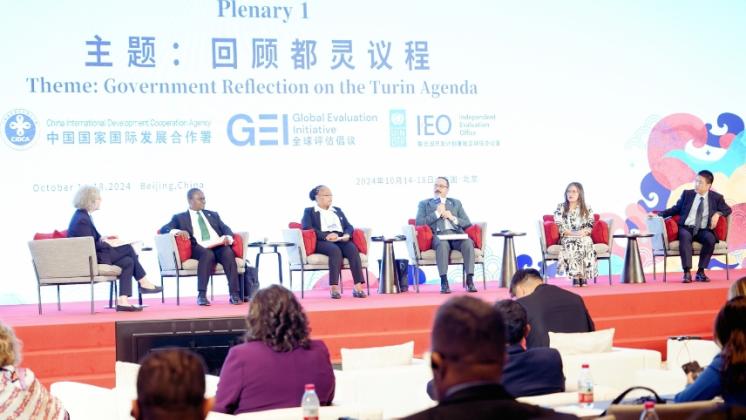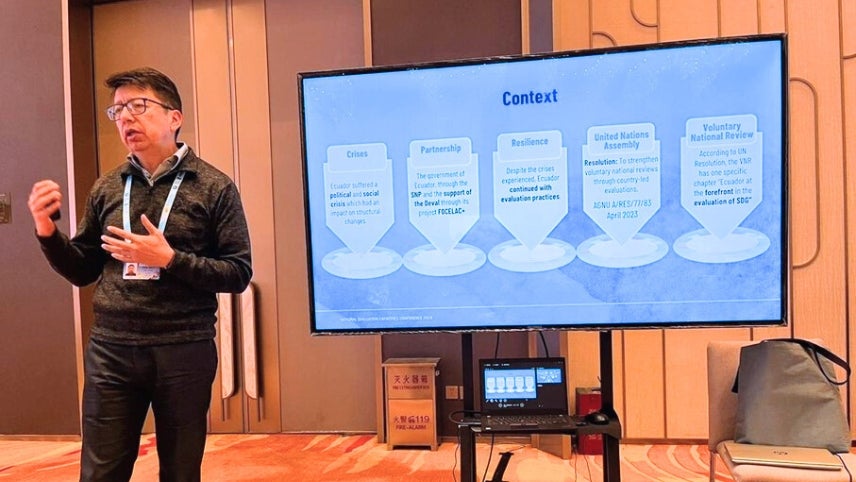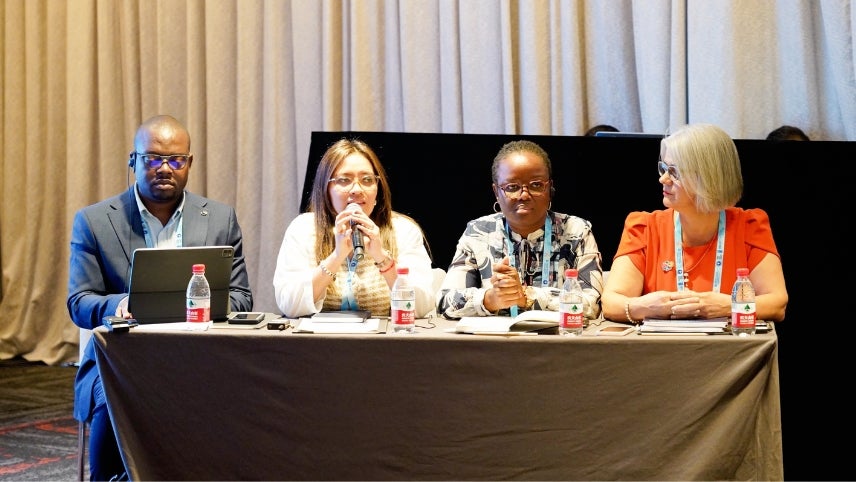Ecuador at the 2024 NEC Conference: Sharing Innovations in Evaluation

From October 14 to 18, Ecuador participated in the 2024 National Evaluation Capacities (NEC) Conference in Beijing. The conference provided a platform for Ecuador to share its innovations, best practices, and experiences in evaluating public programs and policies and strengthening national evaluation capacities.
Joselyn Corrales, Undersecretary of Evaluation at the National Planning Secretariat (NSP) of Ecuador, presented the progress achieved in institutionalizing evaluation processes in the last two years. “These efforts have been fundamental in establishing a culture of evaluation, adapting to changing contexts such as the COVID-19 pandemic and government transitions,” said Ms. Corrales during the conference plenary on strengthening national evaluation systems.
“Ecuador has made significant strides by institutionalizing evaluation processes, overcoming initial perceptions of evaluation as merely an auditing or oversight mechanism. Strategic partnerships, such as with the German Institute for Development Evaluation, have been pivotal in nurturing and advancing this culture of evaluation,“ Ms. Corrales added.

The NEC session "Country-Led Evaluations and the Sustainable Development Goals (SDGs)” spotlighted Ecuador’s country-led SDG evaluation—one of the first in Latin America and the Caribbean. The evaluation demonstrated how the principles of the 2030 Agenda can be integrated into evaluation objectives, methodologies, and tools. It emphasized collaborative learning to foster knowledge generation and capacity building, creating a culture of continuous improvement in implementing the SDGs.
Julio Olivo, Director of Planning and Public Policy Evaluation at NSP, presented two levels of analysis. The first focused on the structures of the Intersectoral Articulation Scheme (IAS) within the Intersectoral Strategic Plan for the Prevention and Reduction of Chronic Child Malnutrition (ISPR-PCM). The second provided a systemic analysis of the IAS function and its alignment with policy objectives. Notably, the evaluation incorporated two core principles of the 2030 Agenda—"Shared Responsibility" and "Leave No One Behind"—as evaluation criteria.

Ecuador also participated in the NEC session on national evaluation systems (NES) assessment tools. Ms. Corrales shared her country’s achievements and challenges in strengthening evaluation capacities based on the results of the National Evaluation Capacity Index (INCE), a diagnostic tool that measures evaluation capacities at the national level. “It showed how the challenges have been converted into knowledge and lessons learned that guide our path towards continuous improvement in the evaluation of public policies and programs in Ecuador,” said Ms. Corrales.
Since its creation, INCE has been a fundamental tool in the effort to foster a culture of evaluation and to strengthen the monitoring and evaluation system in Ecuador. According to Ms. Corrales, INCE has also strengthened the National Evaluation Platform of Ecuador (PNE), which is led by the National Planning Secretariat. The platform provides a space for collaborative work and knowledge exchange between different stakeholders involved in evaluation processes.
Although INCE has faced several challenges, including technical limitations and cultural resistance, “these obstacles have generated important lessons for Ecuador,” said Ms. Corrales. “First, continuous training has been key; we have improved skills in public sector institutions, fostering a positive mindset towards evaluation. Second, inter-institutional collaboration has allowed for the exchange of best practices, strengthening the evaluative approach. Finally, by making data accessible, we have promoted transparency and empowered citizens to actively participate in the evaluation process. In this way, INCE not only measures capacities, but also transforms challenges into opportunities for continuous improvement."
During the NEC session on local values and decolonizing evaluation, Ms. Corrales shared Ecuador’s experience in conducting its first participatory evaluation, which assessed a program that provides socialization and meeting spaces for older adults living in poverty. The evaluation faced challenges, particularly in ensuring the participation of older adults in the evaluation process. Creative solutions, such as tailored training sessions, were key to addressing these hurdles. Training ensured participants understood the evaluation process, leveling the field for active engagement.
“By fostering an inclusive environment, the evaluation encouraged older adults to take part in the design and implementation stages. This approach built a sense of ownership, empowering participants to voice their priorities and experiences. Transparent communication throughout strengthened trust, clarified objectives, and aligned expectations among stakeholders,” said Ms. Corrales.
Contributors:
Julio Olivo, Director of Planning and Public Policy Evaluation at the National Planning Secretariat of Ecuador
Joselyn Corrales, Undersecretary of Evaluation at the National Planning Secretariat of Ecuador